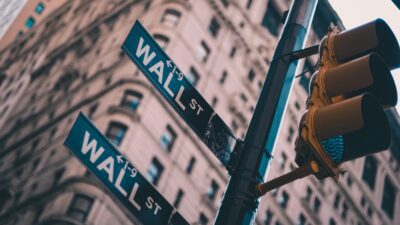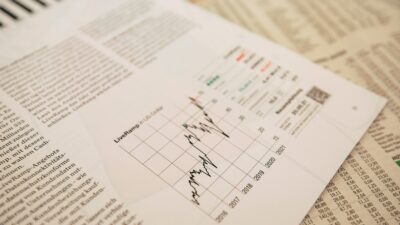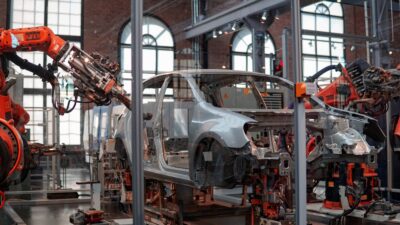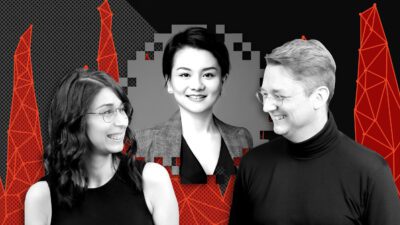Sandra Peter and Kai Riemer

The car industry and food delivery on The Future, This Week
This week: where will the sputtering car industry go? And struggling food delivery apps. Sandra Peter (Sydney Business Insights) and Kai Riemer (Digital Disruption Research Group) meet once a week to put their own spin on news that is impacting the future of business in The Future, This Week.
The stories this week
04:59 – The pandemic will permanently change the car industry
15:28 – Restaurants go it alone, despite delivery app fee reductions
Other stories we bring up
University of Sydney scientists discover ‘virgin’ bees with offspring
The lockdown live-streaming numbers
Twitter will now let its employees work from home indefinitely
Westpac Banking Corp will re-assess the need for staff to be in its major city offices
The car industry faces a short-term crisis and long-term decline
Our previous discussion of oil prices on Corona Business Insights
China’s electric car industry in the COVID-19 storm
The U.S. car industry is restarting after COVID-19
The lockdown has exposed the fatal flaw in Deliveroo’s business model
A huge cocktail-mixing truck is driving around Sydney and dropping off free drinks
You can subscribe to this podcast on iTunes, Spotify, Soundcloud, Stitcher, Libsyn, YouTube or wherever you get your podcasts. You can follow us online on Flipboard, Twitter, or sbi.sydney.edu.au.
Our theme music was composed and played by Linsey Pollak.
Send us your news ideas to sbi@sydney.edu.au.
Dr Sandra Peter is the Director of Sydney Executive Plus and Associate Professor at the University of Sydney Business School. Her research and practice focuses on engaging with the future in productive ways, and the impact of emerging technologies on business and society.
Kai Riemer is Professor of Information Technology and Organisation, and Director of Sydney Executive Plus at the University of Sydney Business School. Kai's research interest is in Disruptive Technologies, Enterprise Social Media, Virtual Work, Collaborative Technologies and the Philosophy of Technology.
Share
We believe in open and honest access to knowledge.
We use a Creative Commons Attribution NoDerivatives licence for our articles and podcasts, so you can republish them for free, online or in print.
Transcript
This transcript is the product of an artificial intelligence - human collaboration. Any mistakes are the human's fault. (Just saying. Accurately yours, AI)
Disclaimer We'd like to advise that the following program may contain real news, occasional philosophy and ideas that may offend some listeners.
Intro This is The Future, This Week on Sydney Business Insights. I'm Sandra Peter, and I'm Kai Riemer. Every week we get together and look at the news of the week. We discuss technology, the future of business, the weird and the wonderful and things that change the world. Okay, let's start. Let's start!
Kai Today in The Future, This Week: where will the sputtering car industry go? And struggling food delivery apps.
Sandra I'm Sandra Peter, I'm the Director of Sydney Business Insights.
Kai I'm Kai Riemer, professor at the Business School and leader of the Digital Disruption Research Group.
Sandra So what should we talk about today?
Kai Well, if we want to stay clear of COVID-19, there is not much to talk about except it is World Bee day, apparently, next week.
Sandra Researchers here at Sydney and they have discovered that some female bees have managed to reproduce without ever...
Kai So is this a story about birds and bees, is it?
Sandra No, it's just bees. It's actually a discovery that could forever destroy the birds and bees sayings.
Kai Virgin bees, apparently. This study is not good for all males out there because these bees can produce little baby bees without ever needing a male in the process. And they exclusively produce female offspring as well.
Sandra Happy World Bee day. So let's get back to corona-related news.
Kai There's some good news for all these streaming platforms out there.
Sandra The live streaming numbers show a enormous increase. Of course, Twitch still saw the biggest increase with hours watched jumping about 50 percent from March to April and 101 percent year over year. So that means that we are now watching about 1600 and forty five billion hours off life streams on Twitch every month.
Kai And since I haven't watched any of those, I must admit, someone out there is watching a lot. Maybe it's all those people working from home. Another big winner is Facebook Gaming, which saw a 72 percent increase between March and April. And YouTube gaming was also up by 14 percent and 65 when compared to last year. So these are massive increases, which signifies a big shift in how people spend their time.
Sandra And that's a big shift across the whole industry. The whole industry is up by 99 percent and grew a full 45 percent between March and April. It remains to be seen whether any of these gains will be maintained after the lock down as we exit the lockdown.
Kai Which also raises the question, why couldn't they manage to get to 100 percent increase, right? So I think that's a bit of a letdown. But it signifies that many of us are spending much more time at home and many of us might actually keep spending a lot of time at home.
Sandra Also in the news was Twitter and now letting its employees work from home indefinitely. The CEO, Jack Dorsey, sent out a letter to all employees this week saying that opening offices was his decision, but when employees are coming back will be theirs.
Kai And so they are working to making it possible for employees to actually keep working from home indefinitely if they choose to do so. And in Australia, Westpac, one of our largest banks, is also considering a similar move.
Sandra So Westpac announced that it will reassess the need for thousands and thousands of people to work from expensive city offices. And since it's seen productivity increase among many of its employees working in home-based teams, they might keep some of these arrangements after the lockdown is over.
Kai And then there's a lot of not-so-good news, especially coming out of Silicon Valley. Big companies such as Kickstarter and Uber laying off massive numbers of people during the crisis.
Sandra And speaking of bad news, but this time around the world, there was a lot of discussion this week around the auto industry.
Kai So the car industry is doing it tough, obviously, dealerships are closed, manufacturing plants are closed. People are not buying cars, economic downturn on the horizon, many people are unemployed. So the predictions for the car industry are not that great, but they're also not straightforward. So this is one that we should look into.
Sandra And the other one, there's one that some of our listeners have been asking that we explore in a bit more detail.
Kai A shoutout to Heinz, who sent this one in.
Sandra And it's, again, one that's not straightforward, with restaurants battling it out with Deliveroo and Uber Eats over who gets to bring our food home.
Kai Yeah, apparently these food delivery services are not doing as great as one would have thought. So let's do this. So, Sandra, what happened in The Future, This Week?
Sandra Our first story comes from The New York Times. It's titled "The Pandemic Will Permanently Change the Auto Industry". And let's make it clear, this was just one of the many stories that are trying to think through what the future of the car industry would mean. There was another article in The Economist talking about the car industry facing a short-term crisis and the long-term decline. There were many articles in The Washington Post, on Bloomberg, looking at how the car industry will restart and if it will manage to survive without significant aid from various governments.
Kai So The Economist points out that the car industry has been doing it tough for the past little while. Global car production has decreased last year, and of course, is in dire straits this year. In the first quarter, there was a more than 20 percent reduction. And in the second quarter, the forecast is a more than 40 percent reduction in global car production. And this is mirrored in car sales. So The New York Times points out that in March, car service was down 50 percent. And in April, a staggering 80 percent, which goes to show just how bad this industry has been impacted by the COVID-19 crisis.
Sandra And let's make it clear that this is a very, very large industry around the world. It employs about 10 million people directly. It's sitting on a very large legacy of investments in thousands of factories around the world, about 1.3 trillion US dollars’ worth of legacy investments. And it has been hit very hard, not only by this crisis, but it's coming off the recession in 2008 that took the industry quite a while to recover from. And whilst the explosion in growth in China initially helped compensate the losses in the wake of the global financial crisis, even that had slowed down already in the last couple of years. and all the gains have now been undone by this pandemic.
Kai Yeah, so The New York Times points out that it took the industry a good 10 years to recover from the 2008 GFC levels. So a couple of years ago, they had just caught up to where they were before. And even before the COVID-19 crisis, there was still about 20 percent excess production capacity in the system. So the industry wasn't really doing all that well in the past 10-15 years to begin with. And at this point in time, many car manufacturers are at risk of being wiped out or swallowed up by other manufacturers in the market.
Sandra Obviously, smaller cars are less profitable, and at the time where margins are everything, these companies have huge fixed costs. Smaller cars like SEAT or Volkswagen might be in more trouble than the big SUV manufacturers.
Kai At the same time, both The New York Times and The Economist point out that electric car manufacturers have been doing much better during this downturn. So the question then arises, where is the industry going and what will its future be?
Sandra So you're right, electric cars have been doing much better. And even though we've seen, for instance, in April, sales fall by 30 percent, according to some initial estimates that are in both articles, the total European car market plummeted by about 80 percent. So they seem to be in a much better position. However, there's a catch here for all the numbers that we're seeing for electric car sales. They might just be an artefact of how we measure these sales. And again, the article points out that carmakers might be taking their time to deliver cars that were actually bought last year.
Kai Let's remember, when you go and buy a Tesla, you don't walk up to a store and drive home. You place an order often online and then they give you a delivery estimate and then they ship or even build your car because there are wait times for these cars. So it might just be a matter of rolling out the pipeline of cars ordered pre-COVID-19.
Sandra And many carmakers may have actually taken their time delivering some of these cars to help meet stricter European Union limits on carbon dioxide emissions that also took effect at the beginning of this year. But the question remains whether this trend will continue. As we discussed before, there are much bigger margins to be made on SUVs, and they will generate higher profits and there might also be an increased demand for it now that fuel prices have dropped quite dramatically with this custom Corona Business Insights, the movements and politics of oil prices, which have now been consistently under $40 a barrel.
Kai So this raises now a real question about where does the car industry see its future, and where are car manufacturers moving? It is no secret that Tesla is doing really well. Its shares are up 64 percent even in this crisis year. And many of the conventional car manufacturers have invested heavily into and directed a lot of their innovation and development teams to work on battery technology, electric drivetrains, and new models to capitalise on the move away from the internal combustion engine. But in a moment of crisis, when the survival of the company is on the line, the question remains will these car manufacturers stick with those innovation activities? Or is it not much more lucrative in the short term to capitalise on high-margin SUVs, a low oil price, at the expense of making the transformation to electric?
Sandra And there is a real danger that much like we've seen during the global financial crisis, that these car companies will cut spending on development of battery technologies, will cut spending on partnerships and development of new electric models. And also government might be less forthcoming with a bailout, let's not forget the last time during the 2008 financial crisis, the US government alone had to bail out the auto industry to the tune of 80 billion dollars.
Kai So this is an interesting one, right? What will governments do? On the one hand, governments in both China and in Europe have been very active in driving the change to electric vehicles with incentives, with subsidies. But at a time when that many jobs are on the line in the European car industry, for example, and let's face it, the vast majority are tied to traditional car making. There might be an incentive to throw out the window the long term plan at the expense of keeping the industries afloat, saving those jobs, and therefore propping up the production of the very cars that the shift to electric was set to replace.
Sandra And this will be extremely difficult, especially as you've mentioned since we are talking about factories that rely on traditional technologies, and even before the coronavirus hit most analysts estimated that the carmakers had at least 20 percent more factory capacity than they actually needed. And given that car sales now are, for instance, in the UK at their lowest since 1946, since after the war, that in the US retailers have sold about 800000 fewer vehicles this year than they had forecast, the projections are much more dire.
Kai And so the point here is that there's now a real danger that the traditional car manufacturers might delay their transition to electric vehicles, which obviously is not good considering that we need to transition to low carbon economies. But it will also potentially put them behind the eight ball in the mid to long-term, as Tesla can cement its dominant position as the electric car manufacturer.
Sandra And indeed Tesla announced just last week that it plans to increase its production of Model 3 sedans in China, for instance, to 4000 a week by the middle of this year. And this is after they have launched the China-made Model Y compact SUV at the beginning of this year.
Kai It might well be that the future of the car industry lies in China for various reasons, one being that the government has been very supportive of new electric vehicle manufacturers. There's said to be about 450, both large and smaller startups, and taxi fleets are going green all across China. And the government expects that by 2025, about 20 percent of sales of cars will be electric vehicles. So it might well be that it will be Tesla and Chinese manufacturers that will dominate this market for decades to come. And on top of this, a lot of the Chinese car manufacturers are sitting on cash reserves that might put them in the position to buy up some of these struggling car brands in the West quite cheaply. Let's not forget that Geely, the large Chinese car manufacturer, already owns a Swedish brand, Volvo, which it acquired a few years ago from Ford Motor Company. So we might see more of this happening.
Sandra But to sum up, the future of the car industry is really not straightforward. But the trends we just discussed pull in very different directions with very different outcomes. But I think in the end, this will be unfortunately decided in the short term as decisions will have to be made around livelihoods, around keeping factories open and the economies going, and these will have very long term implications for profitability in their industry, and for who the ultimate winners will be.
Kai And so it remains to be seen whether the shift from conventional to electric will play out the same way as it was before the crisis and whether there will be a shift from the west to the east in where the future of the car industry will be determined.
Sandra But let's go to another industry that is actually also struggling, but many of us would think it's not. And that is food delivery.
Kai So our second story is coming to us via Heinz, and it is from the Sydney Morning Herald. It's titled "Restaurants go it alone despite Deliveroo and Uber Eats fee reductions".
Sandra The story reports on the fact that Uber Eats and Deliveroo are still charging fairly high commissions on food delivery up to 30 percent. So many restaurants that are already struggling because of the lockdown, have decided to actually hire their own delivery drivers and organise delivery themselves.
Kai So it looks like, surprisingly, that the food delivery services are being disrupted in this crisis. So intuitively, I had assumed that this is a time when companies like Uber Eats and Deliveroo would make huge profits because everyone's staying at home, so people are ordering their food via apps, and they should make a lot of money out of this. But Deliveroo, and there was another article this week, is struggling to the extent that they took a half a billion dollar injection from Amazon just to cover losses and keep itself afloat. So we thought this is really interesting and we'll have a look at what's behind this. Why is this happening?
Sandra Deliveroo has been one of those companies that was the darling of investors. It was once valued at over 2 billion dollars. But as you mentioned now, it had to admit that it's actually not working out and that they are facing bankruptcy without a major cash injection. But let's be clear, it's not the coronavirus that's undoing Deliveroo. Another article in Wired, which we'll link in the shownotes, reports on the fact that the very small margin and the crippling costs of competing for delivery against other companies like Uber Eats had actually put the company in dire financial straits before. So if you look at the UK, there are at least three big players in the market, in the US there's about half a dozen food delivery companies, in Europe there's over 20 food delivery companies and we have many of them here in Australia as well.
Kai So at face value, if a company takes 30 percent commission for every delivery, that looks like a sizeable margin, but the problem here is that on the one hand, there is a cutthroat competition going on in each of those markets. So Uber Eats, Deliveroo, Menulog in Australia, all juggling for position, investing huge amounts of money in advertising to win over customers to make their app the preferred choice. On the other hand, they're giving big discounts to signature brands such as McDonald's, and other brands that every one of those wants to have exclusive on their app. So it is really that competition and the global growth that is eating up the money for the app providers.
Sandra And to be fair, the coronavirus pandemic did not make things any better. We know that, for instance, in March there was a drop of between 2 and 23 percent in food delivery across Europe. There were very small increases since then. And this might seem counterintuitive, but let's remember many restaurants across Europe, and here in Australia as well, have been closed during the lockdown and people did start to cook at home.
Kai Which brings us back to Australia, because one of the contributing factors is that restaurants have started to bypass the apps and organised their own delivery, because they can't live with the apps taking 30 percent of every transaction that they make.
Sandra And the 30 percent might be okay if Uber Eats or Deliveroo is your side business, while your main income comes from people eating in the restaurant. But if this is your entire business model, 30 percent is a huge margin.
Kai Restaurants traditionally have fairly low margins, but if you have dine-in business, you have pick-up, you have your regular transactions that help you cover your fixed cost, you can afford doing Uber Eats on top of this. But if every transaction is take-out, like it is now during the pandemic, the 30 percent is ruinous. You can't really live with that. So out of desperation, restaurants have started innovating and creating their own delivery.
Sandra On the other hand, all the restaurants organising their own deliveries are actually not delivering to previous Uber Eats or delivery app users. They're delivering to patrons who used to come into the restaurant, who now want to support those businesses or want to actually continue to have the meals, but have no other option than have it delivered at home. Once the pandemic is over, it would be interesting to see if this trend will remain, if those patrons now have the opportunity to go back into those restaurants.
Kai So what we're seeing here is that while the food delivery apps are involved in a cut-throat competition with each other, they haven't really fully capitalised on the move away from dine-in to pick-up, because they're not necessarily able to convert those audiences that are normally participating in dine-in experiences to their apps.
Sandra So it remains to be seen how viable food delivery models that we have now, Uber Eats, Deliveroo, how viable they are if they haven't managed to capitalise on this crisis or indeed if we're simply going to see consolidation, Uber Eats now making a play for Deliveroo, and seeing just fewer competitors in what was already an overcrowded market.
Kai And this is where we want to leave it.
Sandra And speaking of food delivery, if you are in Sydney and live anywhere from the eastern suburbs to the northern beaches, there is a huge cocktail mixing truck driving around and dropping off free drinks.
Kai So happy World Cocktail Day. I think we have to go now. See you soon.
Sandra On The Future...
Kai Next week.
Sandra This week?
Kai Yes. But next week.
Sandra On The Future, This Week. Next week. Thanks for listening.
Kai Thanks for listening.
Outro This was The Future, This Week, made possible by the Sydney Business Insights team and members of the Digital Disruption Research Group. And every week right here with us, our sound editor Megan Wedge, who makes us sound good and keeps us honest. Our theme music was composed and played live on a set of garden hoses by Linsey Pollak. You can subscribe to this podcast on iTunes, Stitcher, Spotify, YouTube, SoundCloud or wherever you get your podcasts. You can follow us online on Flipboard, Twitter or sbi.sydney.edu.au. If you have any news that you want us to discuss, please send them to sbi@sydney.edu.au.
Close transcript















